U.N. | California | Colorado | Kansas | Minnesota | New Mexico | Ohio | Pennsylvania | Southeastern Synod | Washington | Wisconsin
Lutheran Office for World Community, United Nations, New York, N.Y.
Dennis Frado, director
 THIRD COMMITTEE OF THE GENERAL ASSEMBLY: During October, UN Special Procedure mandate-holders and other experts delivered reports to the General Assembly’s Third Committee (on Social, Humanitarian and Cultural Issues), as mandated by the Human Rights Council. These reports focused on the advancement of women, indigenous issues, the protection of children and the promotion and protection of human rights to name a few. The meetings were chaired by H.E. Mr. Christian Braun, Permanent Representative of Luxembourg and can be viewed online here.
THIRD COMMITTEE OF THE GENERAL ASSEMBLY: During October, UN Special Procedure mandate-holders and other experts delivered reports to the General Assembly’s Third Committee (on Social, Humanitarian and Cultural Issues), as mandated by the Human Rights Council. These reports focused on the advancement of women, indigenous issues, the protection of children and the promotion and protection of human rights to name a few. The meetings were chaired by H.E. Mr. Christian Braun, Permanent Representative of Luxembourg and can be viewed online here.
Ms. Phumzile Mlambo-Ngcuka, Under-Secretary General and Executive Director, UN Women, gave opening remarks on the Third Committee’s session on Advancement of Women, highlighting that “violence against women and girls and the renewed pushback against women’s rights remain pervasive around the world so as we prepare for the 25th Anniversary of the Beijing Platform for Action in 2020, we need renewed commitment from all.” The Secretary-General focused two reports on Advancement of Women, titled “Improvement of the situation of women and girls in rural areas” and “violence against women migrant workers.” A report was also submitted by the Committee on the Elimination of All Forms of Discrimination Against Women (CEDAW).
The Special Rapporteur on the rights of indigenous peoples report focused on the implementation the right of indigenous peoples to self-determination through autonomy and self-government. The report includes eight recommendations, one including the role of States in adopting and implementing “all measures necessary to ensure the adequate recognition of the rights of indigenous peoples to their lands, territories and natural resources, as that recognition represents the cornerstone of their autonomy and self-government and is essential for their survival as distinct peoples.” Documentation of all reports for the Third Committee’s agenda items can be accessed online here.
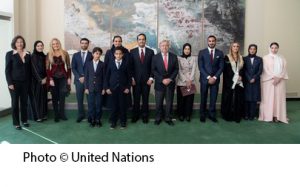 UNITED NATIONS DAY: On October 24, 2019, the United Nations celebrated United Nations Day, marking 74 years since the UN Charter came into force in 1945, launching the United Nations. The Charter consists of a preamble and 19 chapters, calling for the U.N. to “maintain international peace and security, promote social progress and better standards of life, strengthen international law and promote the expansion of human rights”. The United Nations Secretary-General António Guterres commented at its commemoration that “United Nations Day highlights the enduring ideals of the Charter, amid stormy global seas, the Charter remains our shared moral anchor.” Guterres has announced that 2020 will kick off with a UN75 initiative that will feature the world’s largest international dialogue on “the role of global cooperation in building the future we want ” to commemorate the 75th anniversary. A special UN Day Concert, featuring musicians from Qatar (pictured above with the Secretary-General) was also held and can be viewed online here.
UNITED NATIONS DAY: On October 24, 2019, the United Nations celebrated United Nations Day, marking 74 years since the UN Charter came into force in 1945, launching the United Nations. The Charter consists of a preamble and 19 chapters, calling for the U.N. to “maintain international peace and security, promote social progress and better standards of life, strengthen international law and promote the expansion of human rights”. The United Nations Secretary-General António Guterres commented at its commemoration that “United Nations Day highlights the enduring ideals of the Charter, amid stormy global seas, the Charter remains our shared moral anchor.” Guterres has announced that 2020 will kick off with a UN75 initiative that will feature the world’s largest international dialogue on “the role of global cooperation in building the future we want ” to commemorate the 75th anniversary. A special UN Day Concert, featuring musicians from Qatar (pictured above with the Secretary-General) was also held and can be viewed online here.
 MANDATE ON SEXUAL VIOLENCE IN CONFLICT: The ten-year anniversary of the Mandate on Sexual Violence in Conflict was commemorated at the United Nations ECOSOC Chamber on 30 October, 2019, hosted by the Republic of South Africa and the Office of the Special Representative of the Secretary-General on Sexual Violence in Conflict. The event began with imagery from the exhibition “Youth Speak Out Through the Arts” (pictured left), showcasing art from a diverse group of youth working in New York as well as two young artists working in Iraq.
MANDATE ON SEXUAL VIOLENCE IN CONFLICT: The ten-year anniversary of the Mandate on Sexual Violence in Conflict was commemorated at the United Nations ECOSOC Chamber on 30 October, 2019, hosted by the Republic of South Africa and the Office of the Special Representative of the Secretary-General on Sexual Violence in Conflict. The event began with imagery from the exhibition “Youth Speak Out Through the Arts” (pictured left), showcasing art from a diverse group of youth working in New York as well as two young artists working in Iraq.
Ms. Amina Mohammed, United Nations Deputy Secretary-General, stated that “sexual violence in conflict has been called history’s greatest silence, the least reported, the least condemned.” Mohammed reflected on the creation of the mandate as the UN’s commitment to “highlight, prevent and seek justice for these crimes” after it was established through the adoption of Security Council resolution 1888 in 2009.
A ‘survivors hearing’ panel was held with panelists sharing first and secondhand testimonies and recommendations  from those who have experienced sexual violence in conflict. Ms. Nadia Murad and Dr. Denis Mukwege, 2018 Peace Prize Laureates, officially launched the “Global Fund for Survivors of Conflict-Related Sexual Violence” to help survivors and their families rebuild through locally designed solutions including reparations for survivors. Read the 2019 annual “Conflict Related Sexual Violence” report of the United Nations Secretary General here.
from those who have experienced sexual violence in conflict. Ms. Nadia Murad and Dr. Denis Mukwege, 2018 Peace Prize Laureates, officially launched the “Global Fund for Survivors of Conflict-Related Sexual Violence” to help survivors and their families rebuild through locally designed solutions including reparations for survivors. Read the 2019 annual “Conflict Related Sexual Violence” report of the United Nations Secretary General here.
California
Regina Q. Banks, Lutheran Office of Public Policy- California (LOPP-CA) lutheranpublicpolicyca.org
POLICY COUNCIL MEETING AND PRIORITIES: The policy council of the Lutheran Office of Public Policy- CA met at the Luther Center in Glendale, CA on October 26, 2019 to discuss the legislative priorities of the ELCA and LOPP-CA, welcome new staff and plan FUNdraisers for the upcoming program year. It was a great meeting and much was decided. Look for updates soon. But set your calendars now for LUTHERAN LOBBY DAY 2020: Wednesday May 20, 2020. We will use this opportunity to again engage with legislators and staff on issues of concern to Lutherans across the state.
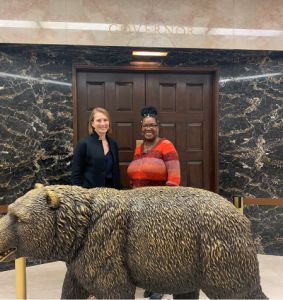 Our priorities for 2020 have shifted but continue to reflect a deep concern for the least and the last in our communities, and care for creation and justice in our golden state. We will continue to advocate for the elimination of Deep Childhood Poverty and accompany those who immigrate to and migrate within California. After listening to your concerns during our congregation visits and in consultation with our partners at Lutheran Social Services of Northern California, we are adding engagement with and for the unhoused to our portfolio of issues. And with the addition of Nicole Newell as our Hunger Advocacy Fellow, we are adding food and farming as a new policy priority for the 2020 legislative session. As the largest producer of food in the U.S., California is dominated by large farms relying on undercompensated migrant labor and extensive use of water throughout the driest of months. These farming systems are too often disconnected from the processing, distributing, eating and waste aspects of the cycle. In keeping with God’s call to care for creation and our neighbor, LOPP-CA seeks to promote equitable food and farming systems in California that support healthy communities, full bellies and the preservation of vital ecosystems. Our policy council has decided to continue to support our ministry and secular partners in the implementation of the Clean Safe Affordable Drinking Water Fund though take a less active role.
Our priorities for 2020 have shifted but continue to reflect a deep concern for the least and the last in our communities, and care for creation and justice in our golden state. We will continue to advocate for the elimination of Deep Childhood Poverty and accompany those who immigrate to and migrate within California. After listening to your concerns during our congregation visits and in consultation with our partners at Lutheran Social Services of Northern California, we are adding engagement with and for the unhoused to our portfolio of issues. And with the addition of Nicole Newell as our Hunger Advocacy Fellow, we are adding food and farming as a new policy priority for the 2020 legislative session. As the largest producer of food in the U.S., California is dominated by large farms relying on undercompensated migrant labor and extensive use of water throughout the driest of months. These farming systems are too often disconnected from the processing, distributing, eating and waste aspects of the cycle. In keeping with God’s call to care for creation and our neighbor, LOPP-CA seeks to promote equitable food and farming systems in California that support healthy communities, full bellies and the preservation of vital ecosystems. Our policy council has decided to continue to support our ministry and secular partners in the implementation of the Clean Safe Affordable Drinking Water Fund though take a less active role.
All of these issues and more will be discussed leading up to and during Lutheran Lobby Day 2020 on May 20, 2020. If these priorities are in your area of expertise or you are looking for ways to get involved with LOPP-CA, there are openings for synod representatives in Pacifica, Sierra Pacific and Southwest California synods. Contact us at regina.banks@elca.org to discuss your service.
SYNOD AND CONGREGATION VISITS: A sincere Thank You goes out to the pastors and members of Immanuel Lutheran Church, San Jose; Ascension Lutheran Church, Thousand Oaks; University AME Zion Church, Palo Alto; and Advent Lutheran Church, Morgan Hill for welcoming us into your worship experiences. We continue to delight in the varied ways that the Holy Spirit manifests in your families. Continue to invite us. We will continue to walk with you.
Thank you to Bishop Mark Holmerud and staff of Sierra Pacific Synod for their hospitality during the 2019 Professional Leaders Conference at Monterey Tides. LOPP-CA was offered primetime to talk about the church’s way forward through advocacy, and God is truly still working through contacts and connections made there. Similarly, a big thank you goes to Trinity Lutheran Women of the ELCA members for welcoming our Director Regina Q. Banks’ offer of the Sunday sermon on October 20th. This was her first sermon. She was humbled and blessed to take that journey with you.
Colorado
Peter Severson, Lutheran Advocacy Ministry-Colorado, www.lam-co.org
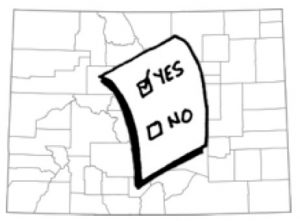 2019 VOTER GUIDE: Our Colorado ballot measure voter guide is now available! Colorado voters received their ballots in the mail in mid-October and have until November 5 to return them. Download our guide here and share it with your friends, family and congregation today.
2019 VOTER GUIDE: Our Colorado ballot measure voter guide is now available! Colorado voters received their ballots in the mail in mid-October and have until November 5 to return them. Download our guide here and share it with your friends, family and congregation today.
THEOLOGICAL CONFERENCE: The Rocky Mountain Synod held its annual Theological Conference in Estes Park, Colorado, in early October. Lutheran Advocacy was on hand to share our 2019 Colorado voter guide, while participants engaged in deep conversation about structures of accountability within the church.
NATIONAL COUNCIL OF CHURCHES: LAM-CO Director Peter Severson joined other ELCA representatives at the National Council of Churches Christian Unity Gathering in Hampton, Virginia. The Joint Action & Advocacy for Justice and Peace Table met during the first day to share updates, stories and resources on advocacy across the denominations participating at the table. On day two, participants joined a ceremony of remembrance at Old Point Comfort to mark the arrival of the first enslaved Africans to English North America 400 years ago.
LUTHERAN DISASTER RESPONSE (LDR): Rocky Mountain Synod representatives participated in the LDR Consultation in New Orleans, Louisiana, focusing on climate change adaptation and mitigation in disaster preparedness. As Colorado faces elevated drought and fire risks in a warming climate, congregations and ministries are invited to be aware of threats and to advocate for policies that will mitigate these risks.
Kansas
REFORM WORK: Kansas Interfaith Action has joined an effort to reform the payday loan industry in the state. Called the Kansas Coalition for Payday Loan Reform, it was initiated by a local DART (community organizing) affiliate which, realizing that this is a statewide issue, put together a wide-ranging statewide coalition – including KIFA. The legislation is being written, and there is a kick-off press conference for the campaign on November 12th. We anticipate this being a bipartisan effort, which unfortunately tends to be rare these days.
We have also had planning meetings with our coalition partners working on criminal justice reform and voting rights (two separate coalitions) to plan strategy for the 2020 session.
MEDICAID EXPANSION: Medicaid Expansion seems to be moving forward. A Senate select committee met to propose a bill that contains a lot of conditionals (if the federal government lets us, then we will expand to only 100% of the federal poverty line; if not, then we’ll expand to 138% of FPL). Each of these conditions costs money and causes delays. We are working for a bill with, as our coalition is saying it, “No barriers and no delays.”
FAITH AND PUBLIC POLICY FORUM: Every year KIFA runs a program called “Faith and Public Policy Forum,” a panel discussion of the pressing issues facing Kansas voters. The participants are representatives of organizations that we are in coalition with, including Kansas Action for Children, the ACLU of Kansas and the Climate & Energy Project. Topics include Medicaid Expansion, criminal justice reform, voting rights, climate and clean energy and more. KIFA Executive Director Rabbi Moti Rieber moderates the panel and presents on KIFA’s legislative priorities, as well as gives remarks about the role of the faith community in developing public policy. We have three events scheduled for November in Wichita, Topeka and Johnson County. Our goal is to give Kansans good, solid information about the issues facing the state, as well as build our base of support for the 2020 legislative session.
Minnesota
Tammy Walhof, Lutheran Advocacy- Minnesota (LA-MN) lutheranadvocacymn.org
POLICY COUNCIL RETREAT: In October, LA-MN Policy Council members gathered at St. John’s Abbey in the center of the state to spend almost 24 hours together. It was a wonderful opportunity to get to know one another better and benefit from both an outside Bible study leader and a guest speaker regarding the Minnesota housing crisis, in addition to evaluating and visioning for the work ahead.
BONDING MONEY FOR HOUSING: The Homes for All Coalition Policy Team has been meeting twice per week as we work to discern additions or changes to the 2019-2020 biennium agenda we created a year ago. In these discussions and presentations, it is very clear that in addition to the housing crisis, Minnesota has a severe statewide shortage of shelter beds for homeless individuals and families.
Given that 2020 is a bonding year at the legislature, bonding will be our primary coalition-wide focus. Last year the coalition made a bold request of $300 million, $200 million in Housing Infrastructure Bonds (HIBs) to increase the number of affordable housing units supplied through private or nonprofit developers and $100 million to create or rehab public housing options. Last session, we were able to secure $60 million in bonding (HIBs), the only area to get any bonding money in the midst of a focus on budget. (We had anticipated that the bulk of that would need to be secured in the second year of the biennium).
After long discussions about the merits of making an even bolder bonding request vs. filling in the remainder of the $300 million request, we opted to go big and bold. We intend to push for $500 million for the creation & rehabilitation of affordable housing. Within that appeal we will be asking the legislature to add shelter development as a one-time eligible use of bonding money.
CLEAN ENERGY & CLIMATE CHANGE: In our environmental coalitions, we are a long way from having our detailed clean energy and climate agenda decided but are busy with partners trying to figure out what may be able to gain momentum in 2020. One hundred percent clean energy/carbon neutral electricity by 2050 will certainly be part of the work again.
New Mexico
Ruth Hoffman, Lutheran Advocacy Ministry—New Mexico (LAM-NM) lutheranadvocacynm.org
 EARLY CHILDHOOD EDUCATION IS ESSENTIAL: LAM-NM has supported putting a constitutional amendment before the voters of our state which would increase the amount of funding available for quality early childhood education programs. Those programs include home-visiting for young children and their parents, pre-Kindergarten, child care assistance and other programs. Such programs have been proven to improve the lives of the children and families who participate in them over generations. Legislation to put the constitutional amendment on the general election ballot will be considered in the upcoming 2010 legislative session.
EARLY CHILDHOOD EDUCATION IS ESSENTIAL: LAM-NM has supported putting a constitutional amendment before the voters of our state which would increase the amount of funding available for quality early childhood education programs. Those programs include home-visiting for young children and their parents, pre-Kindergarten, child care assistance and other programs. Such programs have been proven to improve the lives of the children and families who participate in them over generations. Legislation to put the constitutional amendment on the general election ballot will be considered in the upcoming 2010 legislative session.
EFFECTIVE TAX POLICY IS CRUCIAL TO MEETING THE NEEDS OF OUR NEIGHBORS: LAM-NM advocates for tax policy that is fair and provides stable, sustainable and adequate revenue to meet the needs of our state, particularly the most vulnerable. A good tax system should be fair (distribute the tax burden broadly and progressively, with those with higher income paying more), balanced, accountable and able to be efficiently administered.
Ohio
Nick Bates, Hunger Network in Ohio hungernetohio.com
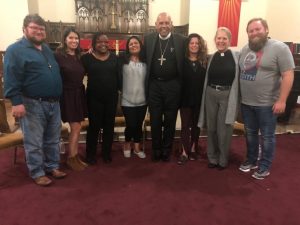
A BROKEN IMMIGRATION SYSTEM: Miriam Vargas moved into Sanctuary in the summer of 2018 at First English Lutheran Church in Columbus. On Tuesday October 29th, Miriam hosted Bishop Allende (NEOS) and others in a Facebook Live broadcast about the ELCA sanctuary declaration. In Ohio, we are not one of the ‘big immigration states,’ but individuals like Miriam are our neighbors and valued members of our community. Deportations threaten our neighbors and our neighborhoods.
In Ohio, we are trying to live into the declaration that the ELCA is a sanctuary denomination. This will look different for everyone, because God gifts us with different gifts and talents to express God’s love for the community. What it does mean for all of us is to ask the question: “How is God calling me to love my neighbor?”
We will continue to advocate to fix a broken immigration system, a system that divides parents from children, a system that sends people to famine soaked and war plagued communities. A system that causes fear and delay for stability for those who are most in need.
It is time to fix a broken system.
You can read more here on how to accomplish this and watch our Facebook Live event here
UNTIL ALL ARE FED: Our director Deacon Nick Bates and board member Pastor Larry Novak both testified this month against SB 165. This bill will put photo IDs onto a household’s SNAP benefits card. This will create headaches for children and spouses who attempt to use the card, headaches for pastors and mission team volunteers who do the grocery shopping for homebound members and headaches for grocery stores who have no clarity on how to implement or enforce these rules.
There is no need for these headaches, because they will do little to nothing to prevent fraud. Instead Ohio should invest these resources into outreach for those who struggling with addiction and help them access the necessary medical services. Take action by clicking here
Pennsylvania
Tracey DePasquale, Lutheran Advocacy Ministry–Pennsylvania (LAMPa) lutheranadvocacypa.org
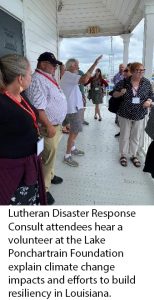 LAMPA VOLUNTEERS AND STAFF ATTEND LUTHERAN DISASTER RESPONSE (LDR) CONSULTATION: Director Tracey DePasquale accompanied seven Pennsylvania Lutheran Disaster Response coordinators and synod representatives to the 2019 LDR Consultation in New Orleans. This year’s consult focused on building relationships with synod, congregation and advocacy partners to address not only disaster relief but climate change mitigation and adaptation. There is great enthusiasm for building on these relationships for the good of our neighbors, near and far. Read more about the hopes for our work together.
LAMPA VOLUNTEERS AND STAFF ATTEND LUTHERAN DISASTER RESPONSE (LDR) CONSULTATION: Director Tracey DePasquale accompanied seven Pennsylvania Lutheran Disaster Response coordinators and synod representatives to the 2019 LDR Consultation in New Orleans. This year’s consult focused on building relationships with synod, congregation and advocacy partners to address not only disaster relief but climate change mitigation and adaptation. There is great enthusiasm for building on these relationships for the good of our neighbors, near and far. Read more about the hopes for our work together.
STAFF ATTENDS GOVERNOR’S ANNUAL FOOD SECURITY PARTNERSHIP SUMMIT: DePasquale and LAMPa Program Director Lynn Fry attended Governor Wolf’s Annual Food Security Partnership Summit in Harrisburg. Attendees received reports on the Blueprint for a Hunger-Fee PA 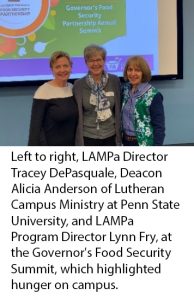 from various state agencies. The afternoon addressed college hunger in Pennsylvania. College students and staff representing schools across the commonwealth shared their personal experiences with hunger and the social services system. Deacon Alicia Anderson of Lutheran Student Community / Lutheran Campus Ministry at Penn State joined LAMPa staff and connected with Penn State students working to fight hunger. LAMPa hopes that the network of Lutheran Campus ministries in Pennsylvania might become engaged in helping to shape policy in this area as the First Lady focuses attention on hunger among college students.
from various state agencies. The afternoon addressed college hunger in Pennsylvania. College students and staff representing schools across the commonwealth shared their personal experiences with hunger and the social services system. Deacon Alicia Anderson of Lutheran Student Community / Lutheran Campus Ministry at Penn State joined LAMPa staff and connected with Penn State students working to fight hunger. LAMPa hopes that the network of Lutheran Campus ministries in Pennsylvania might become engaged in helping to shape policy in this area as the First Lady focuses attention on hunger among college students.
LAMPA STAFF ATTENDS PA HUNGER ACTION COALITION BI-ANNUAL MEETING: Members shared reports on poverty and anti-hunger programs from the perspective of providers and advocates and heard from staff of state human services, agriculture and education departments about impacts of proposed federal rule changes. The coalition discussed strategy for addressing hunger policy together in the face of federal proposals and the upcoming state budget.
 LAMPA JOINS COALITION PARTNERS AT RELIGIOUS SECURITY SUMMIT: Fry joined religious and community leaders in the Capitol to learn about threats to security of religious institutions as we prepared to mark the one-year anniversary of murders at the Tree of Life synagogue. Presentations were shared by: Anti-Defamation League, Pennsylvania Governor’s Office – Public Safety, Pennsylvania Homeland Security, Pennsylvania State Police, Federal Bureau of Investigation (FBI), United States Secret Service and United States Postal Service. LAMPa invited congregation, synod, seminary and social ministry leaders to attend the summit, the first of several to be held around the commonwealth.
LAMPA JOINS COALITION PARTNERS AT RELIGIOUS SECURITY SUMMIT: Fry joined religious and community leaders in the Capitol to learn about threats to security of religious institutions as we prepared to mark the one-year anniversary of murders at the Tree of Life synagogue. Presentations were shared by: Anti-Defamation League, Pennsylvania Governor’s Office – Public Safety, Pennsylvania Homeland Security, Pennsylvania State Police, Federal Bureau of Investigation (FBI), United States Secret Service and United States Postal Service. LAMPa invited congregation, synod, seminary and social ministry leaders to attend the summit, the first of several to be held around the commonwealth.
EDUCATING AND EQUIPPING: DePasquale participated in the inaugural meeting of the Upper Susquehanna 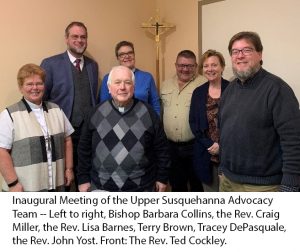 Synod Advocacy Team, launched at the direction of Bishop Collins and Synod Council to support congregations and church leaders in following their baptismal call to strive for justice and peace. She also participated in Lower Susquehanna Synod’s day of equipping on the actions taken at the Churchwide Assembly, offering to assist attendees as they encourage their congregations to live into the calls coming from that gathering – particularly around the social statement on Faith, Sexism and Justice, the Day of Repentance for the Emmanuel Nine, the Declaration of Apology to people of African Descent and declaration of sanctuary denomination. In addition, DePasquale taught about LAMPa’s work at Prince of Peace Lutheran Church in Bangor (Northeastern Pa. Synod) and St. John’s Herr Estate in Columbia (Lower Susquehanna Synod).
Synod Advocacy Team, launched at the direction of Bishop Collins and Synod Council to support congregations and church leaders in following their baptismal call to strive for justice and peace. She also participated in Lower Susquehanna Synod’s day of equipping on the actions taken at the Churchwide Assembly, offering to assist attendees as they encourage their congregations to live into the calls coming from that gathering – particularly around the social statement on Faith, Sexism and Justice, the Day of Repentance for the Emmanuel Nine, the Declaration of Apology to people of African Descent and declaration of sanctuary denomination. In addition, DePasquale taught about LAMPa’s work at Prince of Peace Lutheran Church in Bangor (Northeastern Pa. Synod) and St. John’s Herr Estate in Columbia (Lower Susquehanna Synod).
Southeastern Synod
Hilton Austin, Southeastern Synod advocacy team
CRIMINAL JUSTICE REFORM: The kick-off for the Second Chance campaign was very well attended. There are 31 organizational partners. According to the Georgia Justice Project’s (GJP) Facebook page, “Georgia has the highest rate of correctional control in the nation, yet is one of only a few states that do not allow expungement of convictions, no matter how long ago they occurred. 4.2 million people have a Georgia criminal record (approximately 40% of adults) and as a result they face barriers to employment, housing, higher education and other opportunities long after their sentence is over.
“Employment is the most effective way to reduce recidivism. Changing Georgia’s law so that certain misdemeanor and felony convictions can be restricted and sealed after a period of time will unlock opportunity for thousands of Georgians who are rehabilitated and want to work, rebuild their lives and provide better futures for their families and communities.”
Our synod staff is aware of our GJP partnership and have been given basic information on what “Second Chance” is about.
I also attended a documentary screening at GJP, Life After Life; if you have the opportunity to see it, the film does a good job of representing the barriers that people face after serving their time.
HUMAN TRAFFICKING: While Georgia has made great legislative strides with Safe Harbor, the funding of the rehab programs has been held up by lawsuits. We continue to monitor that process and what is happening with these funds.
HEALTHCARE: The American Cancer Society has targeted Georgia this year for Medicaid Expansion. We have contacted the Georgia chapter to see what that will look like; we should know more next week.
SOUTHEASTERN SYNOD LEADERSHIP CONVOCATION: Most of the Advocacy Policy Council and myself attended our synod leadership convocation at Lutheridge. The theme was “Preaching in Such a Time as This: Kairos, Truth, and Prophetic Gospel,” the Rev. Dr. Sam Giere, Wartburg Theological Seminary, explored the proclamation of Jesus Christ in such a time as this (Esther 4:14), by discerning “the times,” considering the relationship of trust and truth and engaging the prophetic nature of the gospel of Jesus Christ.
GEORGIA INTERFAITH PUBLIC POLICY CENTER: At our October board meeting, we added two people to our Board of Directors: Bishop Kevin L. Strickland and John Moeller, CEO of Inspiritus (formerly Lutheran Services of Georgia). Our 2020 Lobby Day will be February 26. Three of us attended an event at Redeemer Lutheran on October 30th sponsored by Inspiritus, titled “How to Have Hard Conversations Well, The Practice of Empathetic Listening .”
Washington
Paul Benz, Faith Action Network (FAN) fanwa.org
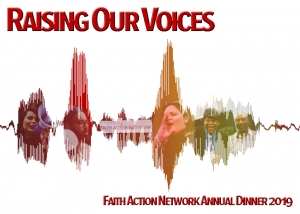 ANNUAL DINNER: FAN’s annual fundraiser will be Sunday, Nov. 10 with the theme “Raising Our Voices.” Our keynote speaker will be ELCA Minister Priscilla Austin from Immanuel Lutheran Church in Seattle. This is a great event where our partners for the common good come together to celebrate our successes and be inspired for the work ahead. We are grateful to the ELCA Hunger as one of our year-round sustaining sponsors.
ANNUAL DINNER: FAN’s annual fundraiser will be Sunday, Nov. 10 with the theme “Raising Our Voices.” Our keynote speaker will be ELCA Minister Priscilla Austin from Immanuel Lutheran Church in Seattle. This is a great event where our partners for the common good come together to celebrate our successes and be inspired for the work ahead. We are grateful to the ELCA Hunger as one of our year-round sustaining sponsors.
NEW ELCA BISHOP INSTALLED: Shelley Bryan Wee is the new bishop for the NW Washington Synod and will 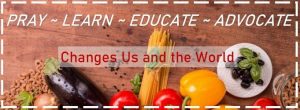 be installed Nov. 2 at Saint Mark’s Episcopal Cathedral in Seattle. Bishop Wee has been a great supporter of FAN, and we look forward to continuing our collaboration with her and the 95 congregations and ministries of this synod.
be installed Nov. 2 at Saint Mark’s Episcopal Cathedral in Seattle. Bishop Wee has been a great supporter of FAN, and we look forward to continuing our collaboration with her and the 95 congregations and ministries of this synod.
FOOD WEEK OF ACTION: Every fall FAN works with the national Presbyterian Hunger program to promote Food Week of Action. We created an action-centered resource for faith communities to use that week and throughout the year. You can view our PLEA (pray-learn-educate-advocate) here: http://fanwa.org/2019/10/food-week-of-action-is-here/
2020 LEGISLATIVE SESSION: FAN members have been meeting with their state legislators to build relationships and prepare for next session which will begin on Jan. 13. The House and Senate will have their annual committee days Nov. 19-22 in Olympia when most legislators will be present for caucus and committee meetings.
CONGRESSIONAL FOCUS: As one of the main congressional issues we are following this season, we are asking our members to urge US Senator Cantwell to put her support behind the expansion of funding for the Earned Income Tax Credit (EITC) and the Child Care Tax Credit (CTC) to keep more households from falling deeper into poverty. We are also thanking her for her leadership on expanding funding for housing tax credits.
Wisconsin
Cindy Crane, Lutheran Office for Public Policy in Wisconsin (LOPPW) loppw.org
SUPPLEMENTAL NUTRITION ASSISTANCE PROGRAM: Via an action alert and social media, we supported our D.C. office’s efforts encouraging people to comment on the new proposed rule for SNAP. The director also sent individual emails to hunger leaders around the state inviting them to access their networks to respond.
CARE FOR GOD’S CREATION: Several months ago, the director suggested that members of the Wisconsin Climate Table explore how we can amplify the positive environmental efforts in parts of our state government within a highly partisan atmosphere. LOPPW is now part of a campaign that is planning how we can support Wisconsin having a clear, actionable plan to equitably meet the 2050 carbon neutral goal.
We are also supporting a bill on regulating PFAS and testing lead in water in facilities that would require child care centers, child care providers and recreational and educational camps to test for lead in drinking water.
HUMAN TRAFFICKING: The director was asked to give a legislative update to the Wisconsin Anti-Human Trafficking Consortium at our last quarterly meeting. We also had a legislator on the phone for part of our meeting and strategized next steps.
LOPPW has continued regular contact with WELCA and other LOPPW supporters to move Safe Harbor forward.
The director has met regularly with LOPPW’s intern, Amelia, who successfully had a letter to the editor published, has organized other college students to advocate and has delivered petitions written by WELCA members to legislators.
NEW PROGRAMS: The director worked with volunteers to plan for our first monthly update on FB live (Wednesday Noon Live) on November 6th and our first pilot of a gathering for young adults (Engage) on November 7th.




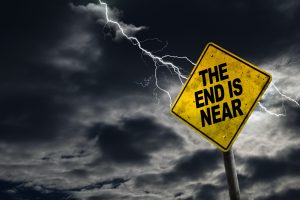














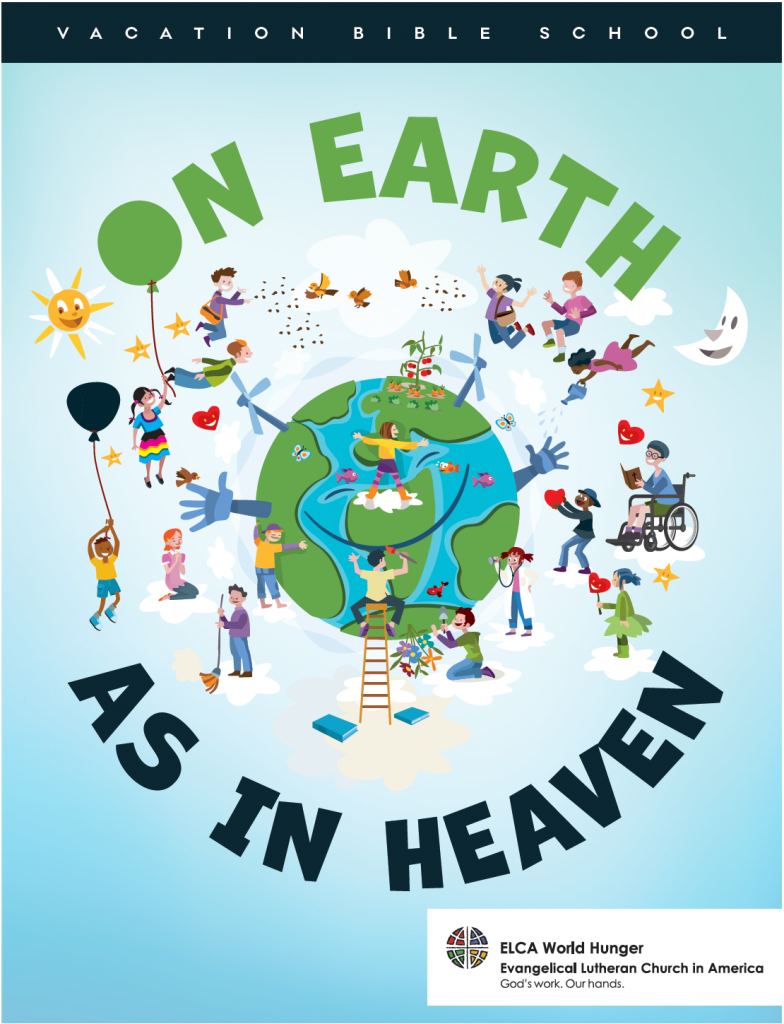



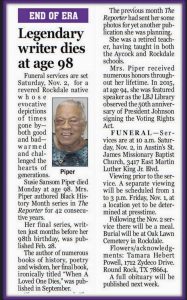 Recently, Susie Piper, my middle school Texas history teacher died at the age of 98. She led a remarkable life and was an amazing teacher. She is one of the reasons I learned early on that white supremacy is a lie and I am so thankful for that lesson. I reached out to her a few years ago and to tell her she and Ms. Petty (a black woman who was my most excellent high school biology teacher) were the best teachers I had from Rockdale. I had some exchanges with Ms. Piper and Emzy Jerome Hebert (her son). We gave each other a few books and I got a history lesson that I sure don’t remember ever hearing in school.
Recently, Susie Piper, my middle school Texas history teacher died at the age of 98. She led a remarkable life and was an amazing teacher. She is one of the reasons I learned early on that white supremacy is a lie and I am so thankful for that lesson. I reached out to her a few years ago and to tell her she and Ms. Petty (a black woman who was my most excellent high school biology teacher) were the best teachers I had from Rockdale. I had some exchanges with Ms. Piper and Emzy Jerome Hebert (her son). We gave each other a few books and I got a history lesson that I sure don’t remember ever hearing in school.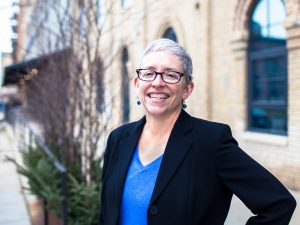 Shari is a European descent Lutheran living in Minneapolis with her wife and two sons. She sells houses and dismantles white supremacy in the Lutheran Church. She is on the board of the European Descent Lutheran Association for Racial Justice and the Minneapolis Synod anti-racism table.
Shari is a European descent Lutheran living in Minneapolis with her wife and two sons. She sells houses and dismantles white supremacy in the Lutheran Church. She is on the board of the European Descent Lutheran Association for Racial Justice and the Minneapolis Synod anti-racism table.
